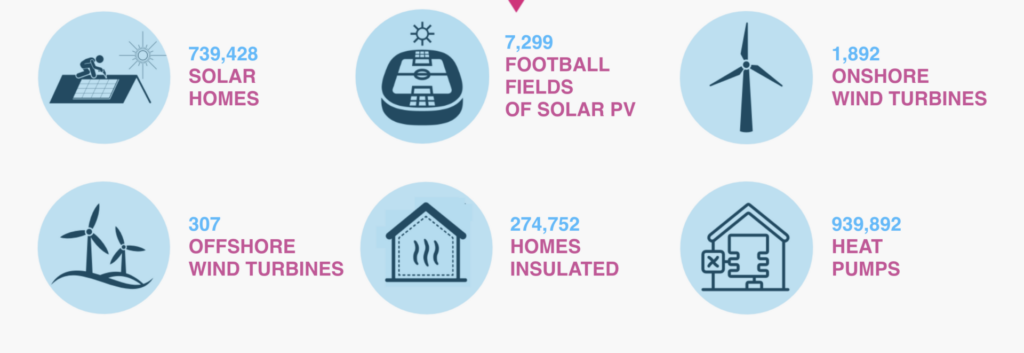A new digital counter developed by Europe Beyond Coal has revealed that the EU spent an estimated €60 billion on Russian coal, oil, and gas since the invasion of Ukraine on 24 February 2022.
Rather than propping up EU dependence on Russian energy, this amount could have paid for considerable renewable energy sources. The graphic below illustrates just how many green energy sources could have been purchased.

NB. The alternative green solutions that could be purchased are in addition to each other, not instead of each other. Credit: Europe Beyond Coal
The EU spent €32.5 billion on Russian oil, €25.9 billion on fossil gases, and €1.6 billion on coal. Belgium spent €1.5 billion on oil, €800 million on gas, and €158 million on coal.
Europe Beyond Coal, in collaboration with Ukrainian NGOs Stand With Ukraine and Ecoaction, as well as the Centre for Research on Energy and Clean Air (CREA), launched the new tracking tool appealing to Member States to embrace the green transition and move away from Russian fossil fuel. This is both for the climate and to stop Russia’s aggression against Ukraine.
“If we want to secure peace, achieve energy independence, and tackle the growing climate and cost of living emergencies, our governments, and energy industry need to end fossil fuel payments and invest heavily in renewable energy,” Kathrin Gutmann, Europe Beyond Coal campaign director, said in a press statement.
Hostage to our energy needs
Russia continues to exert considerable political pressure on the EU by playing on the energy needs of Member States who do not yet have the green energy capacity to forego fossil fuels. The instability in energy markets as a result of international sanctions has served only to benefit Russia.
According to statistics from the Bank of Russia, 2022 was a record year for Russian public finances. Russia is currently running a current account surplus of around $96 billion on the back of high commodity prices. For this year, total revenue for oil and gas will amount to $285 billion, as estimated by Bloomberg.
"Russian fossil fuels are powering the war on my country," Kostiantyn Krynytskyi, head of the energy department at EcoAction, told the Brussels Times. "The export of fossil fuels is the bedrock of the Russian economy. Overall, oil and gas provide approximately 40% of the federal budget revenue and make up close to 60% of Russian exports."
Fuelling Russian war effort
These profits inevitably find their way to the budget of the Russian military. As of 29 April, Russia launched at least $7.5 billion in rockets towards Ukraine, destroying vast swathes of residential areas and killing hundreds of Ukrainian civilians. Only an embargo, experts say, will be enough to weaken the Russian war machine.
“By purchasing Russian fossil fuels, EU countries are fuelling an atrocious war. They are morally obliged to bring this terrible charade to an end by imposing a total ban on all coal, oil and fossil gas imports from Russia,” notes Svitlana Romanko, campaign lead at Stand With Ukraine.
Related News
- Energy bills starting in May on average €500 cheaper per year in Flanders
- EU adopts sanctions against Russia with no end in sight of war
- Belgium will not send howitzers to Ukraine due to unreasonable prices
After China, the largest recipient of Russian fossil energy was Germany, which accepted €12.6 billion since the start of the war, including €11.2 billion in oil. The sixth package of sanctions approved by the EU against Russia includes a ban on Russian oil, which the union expects will come into force at the end of the year. The New York Times estimates that the cost to Russia of the embargo will amount to billions of dollars each year.
The environmental importance of the switch to clean energy has also been highlighted by the advocacy groups. The EU is aiming to produce 50% of its energy from renewables by 2030. To do so, the bloc will have to replace the cheap imports of polluting Russian energy that currently account for a large part of the energy mix.
“Europe has sleepwalked into dependence on Russian fossil fuels…Ramping up spending on energy efficiency and fossil-free, renewable energy sources is essential,” writes Lauri Myllyvirta, lead analyst at CREA.
Europe Beyond Coal is an alliance of civil society groups working to ensure a just transition to a fossil-free, fully renewables-based European energy sector. The group hopes to exit the use of coal by 2030 and switch to fully renewable energy by 2035.

